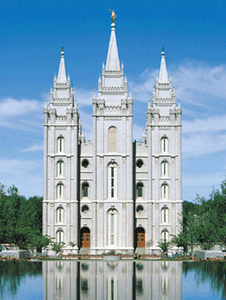Federal Judge Strikes Down Utah Amendment Banning Same-Sex Marriage
December 23, 2013
A United States District Court judge ruled on December 20 that Utah’s 2004 constitutional amendment restricting marriage to a man and a woman violates the U.S. Constitution. He ordered the state to immediately cease enforcement of the same-sex marriage ban. “The court holds that Utah’s prohibition on same-sex marriage conflicts with the United States Constitution’s guarantees of equal protection and due process under the law,” federal District Judge Robert J. Shelby wrote in his 53-page decision. “The state’s current laws deny its gay and lesbian citizens their fundamental right to marry and, in so doing, demean the dignity of these same-sex couples for no rational reason.” Before the county building closed for the weekend, Salt Lake County officials had issued at least 100 marriage licenses to same-sex couples.
Utah is generally considered one of the more conservative and religious of states, and the Church of Jesus Christ of Latter-day Saints, which is headquartered in Utah’s capital, Salt Lake City, responded to the ruling with a statement noting that the church “has been consistent in its support of traditional marriage while teaching that all people should be treated with respect.” Utah Governor Gary R. Herbert condemned the decision and court order, stating that he was trying to determine “the best course to defend traditional marriage within the borders of Utah.” The state attorney general requested an emergency stay of the order pending an appeal, but the 10th U.S. Circuit Court of Appeals rejected the request.

The Mormon Temple and reflecting pool are part of Temple Square in the heart of downtown Salt Lake City, Utah. Utah is one of the most conservative states in the United States. (© Mark E. Gibson, Corbis)
Judge Shelby’s ruling could have far-reaching effects. More than 30 states have passed amendments or laws restricting marriage to a man and a woman. If Judge Shelby’s ruling is upheld, Utah will become the 18th state to permit same-sex marriage, along with the District of Columbia. The decision came one day after the New Mexico Supreme Court ruled that same-sex couples have the right to marry.
In a 5-to-4 vote, the U.S. Supreme Court ruled on June 26 ruled that the federal Defense of Marriage Act (DOMA)–which defined marriage as a union between one man and one woman–was unconstitutional. Passed by Congress in 1996, DOMA barred federal recognition of same-sex marriages for such purposes as Social Security survivors’ benefits, insurance benefits, immigration, and the filing of joint tax returns. The Supreme Court declared the law unconstitutional because it denied same-sex couples the “equal liberty” guaranteed by the Fifth Amendment. The court’s ruling meant that same-sex couples that marry in the states where gay marriage is legal are entitled to the same federal benefits as married opposite-sex couples. However, the ruling did not have broader implications for the legality of same-sex marriages nationwide and did not affect the state laws and amendments banning same-sex marriage.
Additional World Book articles:
- Civil unions
- Civil rights 2010 (a Back in Time article)
- Civil rights 2012 (a Back in Time article)


